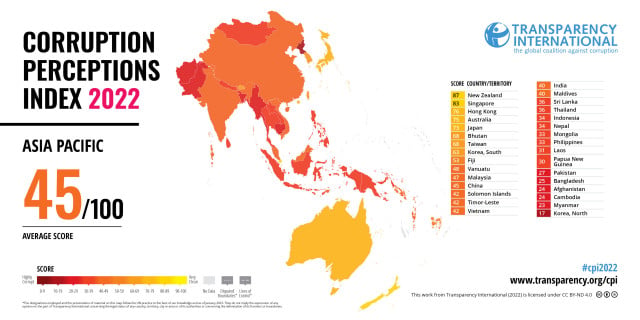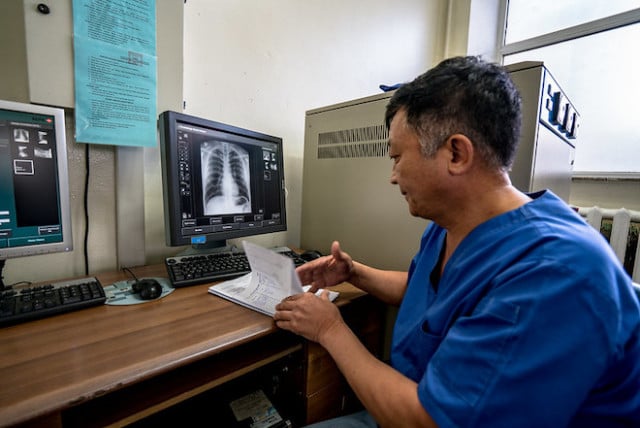Cambodia Makes Gains in Corruption Battle

- By Phoung Vantha
- January 31, 2023 6:35 PM
PHNOM PENH – Cambodia has made a slight improvement in the Transparency International (TI) corruption ranking but is still placed 150th out of 180 countries listed.
The country scored 24 out of 100. In the 2021 Corruption Perceptions Index (CPI), the country received a score of 23 out of 100 and was ranked 157th globally.
Government spokesman Phay Siphan said the government was dissatisfied with the index as its methodology was not clear and showed only quantity, not quality. The index was not of good enough quality for the government to use as a database.
Cambodia’s CPI scores have steadily increased from 20 in 2018 to 24 in 2022. This may be seen as a good development but the low score suggests that a lot more work is needed to combat corruption, TI says.
The latest result indicates that Cambodia continues to trail far behind other nations in Asia and the rest of the world.
Cambodia holds the second-lowest spot in the ASEAN region and the third-lowest position in the Asia Pacific, coming above only Myanmar (157th) and North Korea (171st).
TI says analysis of the eight principal sources used to calculate Cambodia’s score shows that this year’s marginal gain reflects efforts to revitalise and promote the post COVID-19 economic development, improve business environment, enhance public services, and strengthen public financial management, especially fiscal transparency and resource mobilisation.
However, a perceived lack — if not an absence — of efforts to advance good governance and democracy prevent the country from receiving a substantially higher score.
“We commend the Cambodian government for the many achievements it has made in recent years, which have resulted in a steady decline in small-scale corruption,” Transparency International Cambodia executive director Pech Pisey said at the launch of the latest report.
“Perhaps most notably among these have been the Public Financial Management Reform programme and the One Window Service initiative, which have contributed significantly to the improvement in revenue mobilisation, fiscal management and public service delivery.
“However, we also believe public financial management reform must go hand in hand with democratic and rule of law reforms.
“Without the latter reforms, public financial management reform would be ineffective and unsustainable as it would lack the necessary oversight and accountability to ensure that public funds are being used responsibly and transparently.
“Only with a strong political will and commitment to reforming the rule of law can grand corruption — which remains prevalent and the most consequential in Cambodia — be reduced,” he said.
TI urged the government to speed up reforms by sanctioning corrupt behavior by effective enforcement of anti-corruption legislation.
Rights which were needed to hold power to account should be upheld. The government should end restrictions on freedoms of expression, association and assembly. Justice for crimes against human rights defenders must be an urgent priority.
Institutional checks on power should be restored and strengthened, it says. Public oversight bodies such as anti-corruption agencies and audit institutions need to be independent, well-resourced and empowered.
Parliaments and the courts must be independent and able to prevent executive overreach. For effective oversight, Cambodia must ensure the highest integrity in elections and a conducive environment for all citizens, political activists, journalists and businesses to fully exercise their civic and political rights enshrined in the Constitution.
TI calls for anti-corruption and access to information laws meeting international standards.
It also recommends promotion of fair competition and a better level playing field for the private sector, including promoting corporate ownership transparency, advancing transparency in public procurement and promoting equal compliance.
Phay Siphan said the government had put in place policies for transparency and accountability such as reformed budget administration for officials’ salaries through bank credit cards.
The Anti-Corruption Unit had arrested many corrupt officers and people who were involved but he could not put a number on it.
The government had also educated people to understand and oppose corruption. Mechanisms prevented corruption and strengthened law enforcement.
TI results for other ASEAN nations have been mixed, with a number of countries seeing a drop in their scores. The sharpest fall was recorded by Myanmar, which slipped from 28 to 23, making be viewed as the most corrupt country in Southeast Asia.
Singapore stays among the top five cleanest countries worldwide despite its score dropping two points.
Other nations whose scores have decreased are Indonesia (down from 38 to 34) and Malaysia (48 to 47). Countries in the region that registered an improvement are Vietnam (39 to 42), Thailand (35 to 36) and Lao PDR (30 to 31). Only the Philippines’ score remains unchanged (33).















